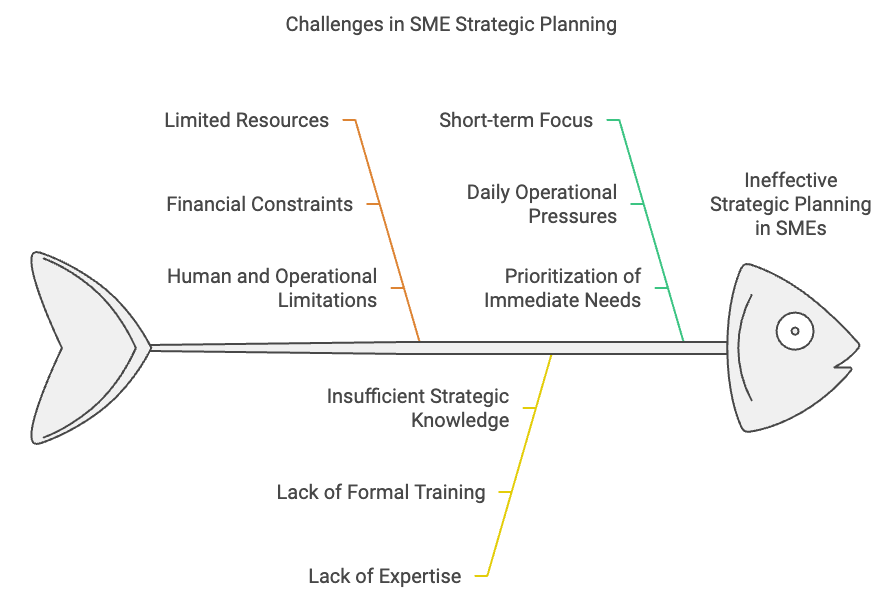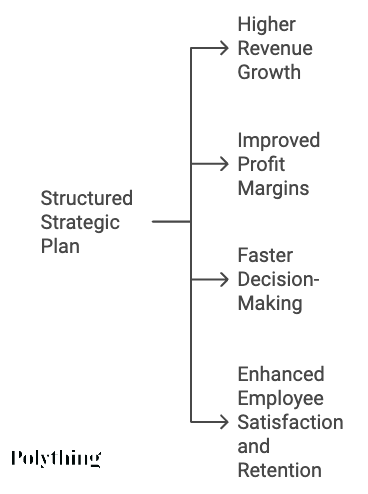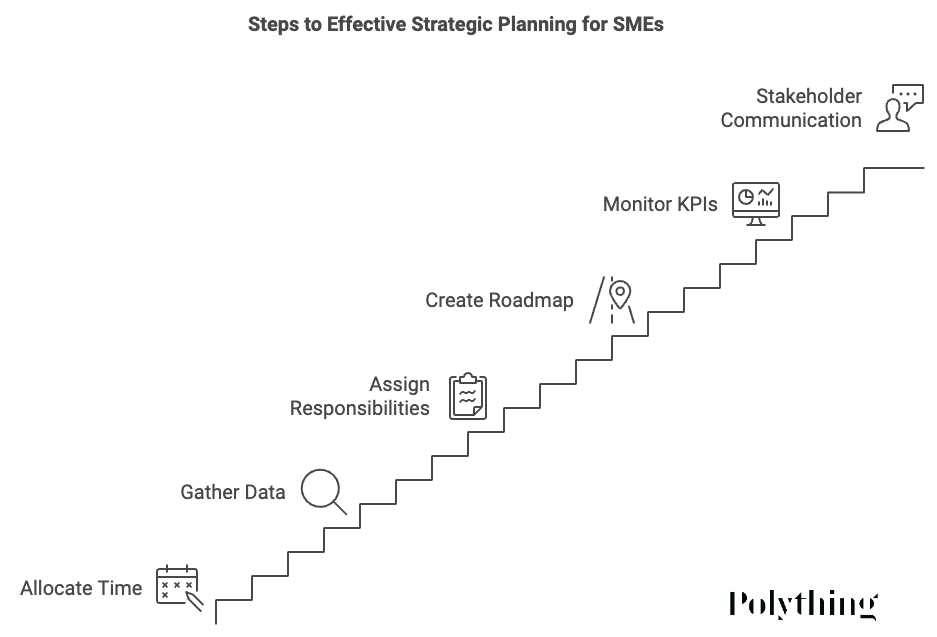
As a digital strategist and marketer I have found over the years that strategic planning is essential for small and medium enterprises (SMEs) aiming to grow. Now research shows that SMEs with formal strategic planning processes experience significant benefits, including:
– 12 per cent higher revenue growth
– 8 per cent higher profit margins
– and a 30 per cent increase in decision-making speed.
Also, an added benefit is that it can enhance employee satisfaction and retention by up to 15 per cent (Source: Semantic Scholar). This illustrates the role strategic planning can play in achieving both financial and operational success.
Strategic planning can help SMEs focus on long-term objectives, identify growth opportunities, and navigate potential challenges. An extra boon is that compared to larger corporations, SMEs have a more streamlined decision-making process, allowing them to respond swiftly to market shifts and competitive threats (MoreThanDigital Insights).
This guide will explore how business owners can create a dynamic strategic plan that is adaptable, ensuring they remain agile and poised to seize new opportunities.
Challenges in SME Strategic Planning

I have also observed over the years that SMEs face unique challenges when it comes to strategic planning. They often struggle with constraints that larger organisations do not experience:
● Limited Resources – Often financial, human, and operational resources are scarce. The Federation of Small Businesses (FSB), says 60 per cent of SMEs cite resource limitations as a major barrier to effective strategic planning.
● Lack of Expertise – Most of the time they donʼt have the skills necessary for formal strategic planning. The same research also indicates that around 40 per cent of SME leaders have never undergone formal training. The impacts are obvious.
● Short-termism – Due to daily operations, owners may prioritise immediate needs over longer-term planning. This short-termism leads to missed growth opportunities and a lack of clear direction. Studies show that SMEs that fail to dedicate time to strategic planning are 25 per cent more likely to struggle with consistent growth compared to those that do.
To address these challenges we need a proactive approach, including seeking external expertise, allocating time for strategic workshops, and leveraging new tools and frameworks.
The Impact on SME Performance
The impact canʼt be overstated. SMEs that adopt formal strategic planning see improvements across multiple areas of their business:
 12 per cent Higher Revenue Growth – SMEs with a structured strategic plan experience, on average, 12 per cent higher revenue growth compared to those without formal plans. This is due to their ability to identify and capitalise on growth opportunities.
12 per cent Higher Revenue Growth – SMEs with a structured strategic plan experience, on average, 12 per cent higher revenue growth compared to those without formal plans. This is due to their ability to identify and capitalise on growth opportunities.- 8 per cent Better Profit Margins – Strategic planning helps SMEs make informed decisions, optimise their operations, and manage costs. As a result, SMEs with strategic plans report an 8 per cent increase in profit margins.
- 30 per cent Faster Decision-Making – Research suggests having a plan helps businesses make decisions 30 per cent faster. With goals and strategies already outlined, owners can respond to market changes with agility.
- Enhanced Employee Satisfaction and Retention – A formal strategic plan provides clarity of purpose, which helps founders and employees understand their roles and contributions to success. This could lead to a 15 per cent improvement in employee satisfaction and retention rates.
A study conducted in the Gauteng Province of South Africa highlights three key factors that contribute to the success of strategic planning in SMEs: mission and vision statements, environmental scanning, and the formality of the planning process (source: Semantic Scholar). Of these factors, the formality of strategic planning was found to have the strongest impact on SME performance.
By starting a formal strategic process, owners can significantly enhance their overall performance, navigate new and future challenges, and seize growth opportunities.
Creating Flexible Strategic Plans
An effective plan includes several key components that help guide the SME toward its objectives. Understanding and implementing these components helps create a robust and actionable strategy. Here are the elements to consider:
● Internal Environment Analysis – Identify the strengths and weaknesses within the organisation. Tools like SWOT, BCG and analysis can help SMEs understand where they excel and what areas need improvement (MoreThanDigital Insights). A clear understanding of internal capabilities is needed to align resources and maximise growth potential.
● External Environment Analysis – Assess industry trends, economic conditions, and consumer preferences. Tools such as PESTLE analysis can help SMEs evaluate these external factors and adjust their strategies accordingly.
- Data Analytics – Leveraging data analytics is crucial for making informed decisions. SMEs can use different types of data analysis to understand their performance and predict future outcomes:
- Descriptive Analysis – Understanding past performance.
- Diagnostic Analysis – Identifying reasons for successes or failures.
- Predictive Analysis – Forecasting future trends and opportunities.
- Prescriptive Analysis – Determining the optimal courses of action based on insights (365 Finance).
- Market Research – Conducting market research is critical for understanding customer needs, market trends, and the competitive landscape. Insight helps shape innovation, tailor offerings and to remain competitive. For example, understanding emerging trends can help identify potential new product lines or market segments (British Business Excellence Awards).
- Risk Mitigation and Adaptability: Strategic planning should also involve risk assessment and mitigation strategies. Business owners need to anticipate potential threats and evolving market conditions.
- Setting Clear Objectives and Goals: Establishing SMART or CLEAR goals is crucial for guiding efforts and tracking progress. CLEAR goals help keep the entire organisation focused and aligned with the strategic direction of the company.
Implementation Strategies

To effectively execute strategy, SMEs must focus on practical implementation strategies that ensure their goals are met. Here are some key steps:
- Allocate Dedicated Time for Planning – annual workshops and monthly evaluations help ensure the strategic plan remains relevant and on track. Dedicating time to planning keeps the focus on long-term objectives.
- Gather Relevant Data – Collecting and analysing data from both internal reports and external research informs decision-making. This data will help SMEs make evidence-based adjustments to their plans as needed.
- Assign Responsibilities – Clearly define roles and responsibilities for team members involved in executing the strategic plan. Ownership ensures accountability and encourages team members to take initiative.
- Create an Implementation Roadmap – Break down objectives into actionable steps. A roadmap helps SMEs visualise the steps required to achieve their goals, making it easier to monitor progress and adjust as needed.
- Monitor Key Performance Indicators (KPIs) – Tracking performance with a set of KPIs is essential for evaluating the success of the plan. The team should focus on 10 or more KPIs that provide insights into key areas of the business. A Balanced Scorecard (source: hbr.org) framework can be useful for this.
- Regular Stakeholder Communication – Provide stakeholders—including employees, customers, and partners—with updates and feedback is crucial for ensuring that everyone is aligned with the objectives.
- Adapt as Needed – Flexibility ensures effective strategic planning. Business owners should be prepared to adapt their strategies as market conditions change, celebrating small wins along the way and making adjustments to stay on course.
By following these implementation strategies, SMEs can ensure that their strategic plans are effectively executed and deliver tangible results.
Leveraging Data
Data analytics plays a crucial role in enhancing the strategic planning process. By leveraging data, SMEs gain valuable insights to inform their strategies and help them stay competitive. Here are some ways to do this:
- Identify Profitable Market Segments – Data shows which market segments are most profitable, enabling you to allocate resources effectively and focus on areas with the highest potential for growth.
- Develop Targeted Marketing Strategies – By analysing customer data, you can develop resonance with specific customer groups. This approach helps optimise marketing efforts and improves the return on investment.
- Make Evidence-Based Decisions – Data-driven insights provide a solid foundation for making strategic choices, whether it’s expanding into new markets, launching new products, or adjusting existing offerings.
Adopting a data-driven approach to strategic planning enables SMEs to navigate uncertainties with confidence and resilience, positioning themselves for long-term success in today’s rapidly evolving business landscape. Consider leveraging a brand audit to identify profitable market segments and enhance your strategic initiatives.
Resilient and Flexible Plans
We established that strategy and planning is a clear route for you to achieve your business goals. A flexible plan also allows management to pivot when needed, ensuring they can respond to changing market conditions and placing less burden on you.
For those of you ready to take their strategy to the next level, and who want to explore further insights, reach out. We can look into your specific challenges and opportunities, and craft a pathway to success.
